
INTERNATIONAL JOURNAL OF LIFE CYCLE ASSESSMENT
metrics 2024
Unveiling the complexities of life cycle assessments for impactful solutions.
Introduction
International Journal of Life Cycle Assessment, ISSN 0948-3349, E-ISSN 1614-7502, is a premier publication in the field of environmental science, published by Springer Heidelberg in Germany. With a commitment to advancing knowledge and practices in life cycle assessment, the journal ranks in the top quartile (Q1) of its category as of 2023 and holds a distinguished position in Scopus with a rank of 29 out of 233, placing it in the 87th percentile within the field. Covering pivotal developments from its inception in 1996 to its projections for 2024, the journal aims to disseminate high-quality research that contributes to sustainable development and environmental management practices. Although not currently an open access journal, it provides valuable insights for researchers, professionals, and students interested in assessing the environmental impact of products and processes. Engaging with the International Journal of Life Cycle Assessment offers a platform for sharing innovative methodologies and case studies, essential for driving forward the sustainability agenda.
Metrics 2024
 1.20
1.20 4.90
4.90 4.80
4.80 131
131Metrics History
Rank 2024
Scopus
IF (Web Of Science)
JCI (Web Of Science)
Quartile History
Similar Journals
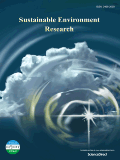
Sustainable Environment Research
Connecting minds for a healthier planet.Sustainable Environment Research, an esteemed journal published by BMC, serves as a pivotal platform for disseminating innovative research in the fields of Environmental Engineering, Pollution, and Renewable Energy. Established in 2016 as an Open Access journal, it facilitates the widespread sharing of knowledge and advancements across the globe, reflecting its commitment to enhancing environmental sustainability. With an impressive Q1 ranking in multiple categories, including Water Science and Technology and Pollution, the journal is recognized for its significant impact, currently holding a rank of 31st in Environmental Science - Water Science and Technology. The journal actively invites researchers, professionals, and students to contribute to crucial discussions around sustainable practices and technologies, thus addressing worldwide environmental challenges. Based in Taiwan but accessible internationally, Sustainable Environment Research provides a valuable resource for those dedicated to advancing the science of sustainability.
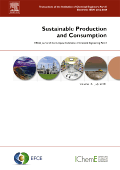
Sustainable Production and Consumption
Exploring Solutions for a Greener TomorrowWelcome to Sustainable Production and Consumption, a premier journal published by Elsevier in the vibrant field of sustainability and environmental science. With an ISSN of 2352-5509, this journal has established itself as a leading platform for innovative research and discourse on sustainable manufacturing, consumption practices, and environmental technologies. As evidenced by its impressive 2023 rankings—Q1 in Environmental Chemistry, Environmental Engineering, Industrial and Manufacturing Engineering, and Renewable Energy, Sustainability and the Environment—the journal ranks among the top tier of its field. Researchers and professionals alike are invited to explore the journal’s rigorous peer-reviewed articles, which aim to advance the understanding and implementation of sustainable practices across various industries. With a strong commitment to disseminating impactful research, Sustainable Production and Consumption serves as an essential resource for academics, policy makers, and industry leaders seeking to address the challenges of modern environmental sustainability.
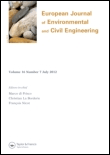
European Journal of Environmental and Civil Engineering
Transforming Knowledge into Action for a Sustainable Built EnvironmentThe European Journal of Environmental and Civil Engineering, published by Taylor & Francis Ltd, is a prestigious peer-reviewed journal that serves as a vital platform for advancing knowledge in the fields of Civil and Structural Engineering as well as Environmental Engineering. With an impressive impact factor and categorized in the Q2 quartile for both engineering fields, this journal occupies a significant position in the scholarly community. Its focused scope encompasses innovative research, case studies, and practical applications that address contemporary environmental and infrastructural challenges. Researchers, professionals, and students alike benefit from the journal's commitment to high-quality discourse, as evidenced by its Scopus rankings, which place it in the top 30% in Civil and Structural Engineering and the top 40% in Environmental Engineering. Through the publication of cutting-edge studies and a commitment to fostering interdisciplinary dialogue, the European Journal of Environmental and Civil Engineering remains an essential resource for those dedicated to improving our built environment and safeguarding our natural resources.
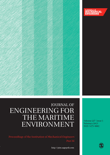
Proceedings of the Institution of Mechanical Engineers Part M-Journal of Engineering for the Maritime Environment
Elevating Engineering Standards for the Maritime EnvironmentProceedings of the Institution of Mechanical Engineers Part M - Journal of Engineering for the Maritime Environment, published by SAGE Publications Ltd, is a leading scholarly journal that addresses critical advancements in the field of maritime engineering. With an ISSN of 1475-0902 and an E-ISSN of 2041-3084, this journal serves as an essential platform for researchers and practitioners alike, disseminating original research, reviews, and case studies relevant to mechanical and ocean engineering. Recognized for its rigorous peer-review process, it currently holds a commendable Q2 ranking in both Mechanical Engineering and Ocean Engineering. The journal's reputation is bolstered by its strategic emphasis on innovative practices and sustainability in maritime environments. By providing a valuable resource for interdisciplinary collaboration, the journal facilitates the intersection of technology and engineering solutions critical for the evolving challenges within the maritime sector. Researchers, professionals, and students alike will find this journal instrumental in keeping abreast of the latest developments, best practices, and future directions in maritime engineering.
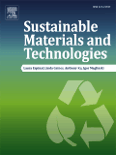
Sustainable Materials and Technologies
Elevating Standards in Sustainable Materials and TechnologiesSustainable Materials and Technologies is an esteemed journal published by Elsevier, focusing on pioneering research and innovative solutions in the fields of industrial engineering, materials science, and environmental sustainability. With a prestigious Q1 ranking in multiple relevant categories—including Industrial and Manufacturing Engineering, Materials Science, Renewable Energy, Sustainability, and Waste Management—this journal is positioned as a leading platform for disseminating high-impact research that addresses pressing challenges in material sustainability. Recognized for its rigorous peer-review process and commitment to academic excellence, Sustainable Materials and Technologies is dedicated to providing open access to groundbreaking studies and practical methodologies that drive forward the agenda for a sustainable future. Since its inception in 2014, the journal has been integral for professionals, researchers, and students who are engaged in the quest for innovative materials and technologies that minimize ecological footprints. Join a community at the forefront of sustainability science by contributing to and engaging with the transformative research published in this pivotal journal.

Clean Technologies and Environmental Policy
Fostering dialogue on sustainable development and clean technologies.Clean Technologies and Environmental Policy is a prestigious journal published by Springer, dedicated to advancing the field of environmental science through the lens of sustainable technology and policy-making. Since its inception in 2004, the journal has carved out a significant niche within the academic community, boasting an impressive impact factor reflective of its quality, as evidenced by its ranking in the Q1 and Q2 categories across various disciplines, including Environmental Engineering and Business, Management and Accounting. With a focus on innovative approaches to managing environmental challenges, the journal covers a wide array of topics from management strategies in environmental engineering to methodologies in policy development. This comprehensive scope positions it as an essential resource for researchers, professionals, and students seeking to contribute to the dialogue on sustainable development and environmental stewardship. Although it operates without Open Access, the journal ensures rigorous peer review and timely publication of high-quality research, facilitating the dissemination of knowledge necessary for informed decision-making in the ever-evolving field of environmental science.

International Journal of Renewable Energy Research
Shaping the future of energy through rigorous research.International Journal of Renewable Energy Research (IJRER) is a distinguished peer-reviewed journal dedicated to advancing the field of renewable energy through innovative research and comprehensive analyses. Published by the esteemed INT JOURNAL RENEWABLE ENERGY RESEARCH, this journal has established itself as a vital resource for academics and industry professionals alike since its inception in 2011. With a focus on a wide array of topics in Energy Engineering and Power Technology and Renewable Energy, Sustainability and the Environment, IJRER has been recognized for its contributions, attaining a Q3 categorization in Energy Engineering and Power Technology and a Q4 rank in Renewable Energy for 2023. The journal is indexed in Scopus, demonstrating its global reach and impact, with notable rankings in both relevant categories. Researchers can access a wealth of valuable insights and findings that are crucial for fostering sustainable practices and technologies. Thus, IJRER plays a pivotal role in driving the future of renewable energy research and innovation.
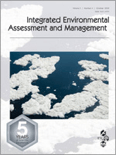
Integrated Environmental Assessment and Management
Advancing interdisciplinary insights for a sustainable future.Integrated Environmental Assessment and Management, published by Wiley, stands at the forefront of interdisciplinary research in the fields of environmental science and geography. With an impact factor reflective of its significant contribution to the academic community, this journal is categorized as Q2 in Environmental Science, Q1 in Geography, Planning and Development, and Q2 in Medicine as of 2023. Covering a broad spectrum of topics, it facilitates the integration of assessment and management practices crucial to addressing contemporary environmental challenges. As of the convergence years from 2005 to 2024, the journal has consolidated its reputation, holding notable ranks in Scopus, including #121 in the Social Sciences—Geography, Planning and Development category and #62 in General Environmental Science. While this journal does not currently operate under an open access model, it remains an essential resource for researchers, professionals, and students who seek to enhance their understanding of environmental and geographical issues through rigorous scientific inquiry.

BioEnergy Research
Exploring Frontiers in Bioenergy ScienceBioEnergy Research is a premier journal published by SPRINGER, dedicated to advancing the field of bioenergy through rigorous scholarship and innovative research. Since its inception in 2009, the journal has emerged as a vital resource for academics, industry professionals, and policymakers involved in the production and utilization of biofuels and other renewable energy sources. With an impressive HIndex and a commitment to quality, it has achieved Q1 status in Agronomy and Crop Science and Q2 rankings in both Energy (miscellaneous) and Renewable Energy, Sustainability and the Environment as of 2023. This positions BioEnergy Research among the top-tier publications in these interconnected fields, offering a platform for disseminating groundbreaking research, practical applications, and critical reviews. Although not open access, the journal's content remains accessible to a broader audience, making it an essential tool for driving the global transition towards sustainable energy solutions. Explore issues spanning from fundamental research to applied methodologies, and contribute to the dialogue on how bioenergy can meet the challenges of a dynamic environmental landscape.

World Electric Vehicle Journal
Navigating the Future of Eco-Friendly MobilityWorld Electric Vehicle Journal, published by MDPI, is a leading Open Access journal dedicated to advancing the field of electric vehicles and sustainable transportation. Since its inception in 2008, this journal has built a commendable reputation, reflected in its current Q2 ranking in the category of Automotive Engineering according to the 2023 metrics, positioning it among the top 30% of journals in its field with a Scopus rank of 36 out of 125 and a distinguished 71st percentile ranking. This multidisciplinary platform invites original research, innovative reviews, and insightful contributions that explore technological, economic, and environmental aspects of electric vehicles, promoting collaboration among researchers, industry professionals, and policymakers. With its global reach and commitment to high standards, the journal is a vital resource for understanding the challenges and advancements in the electric vehicle sector, fostering an informed approach to future developments in sustainable transportation.